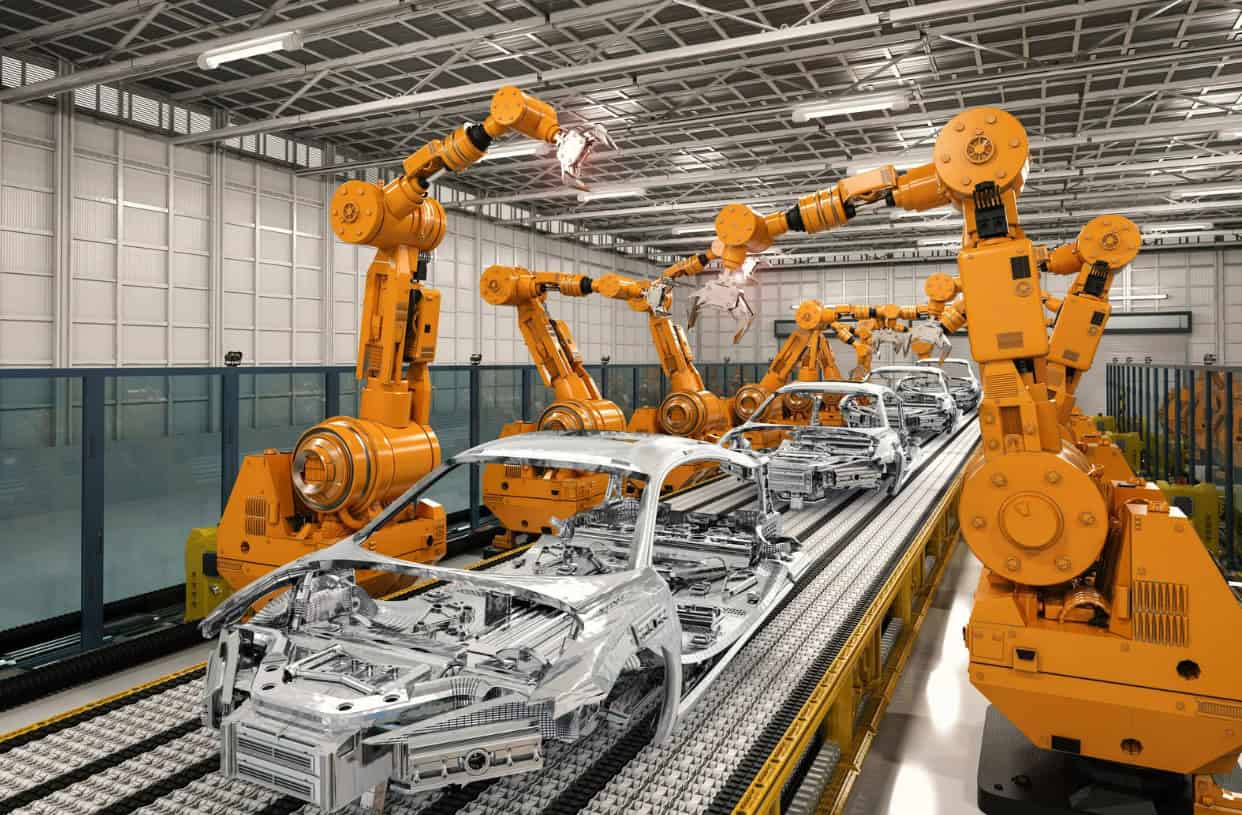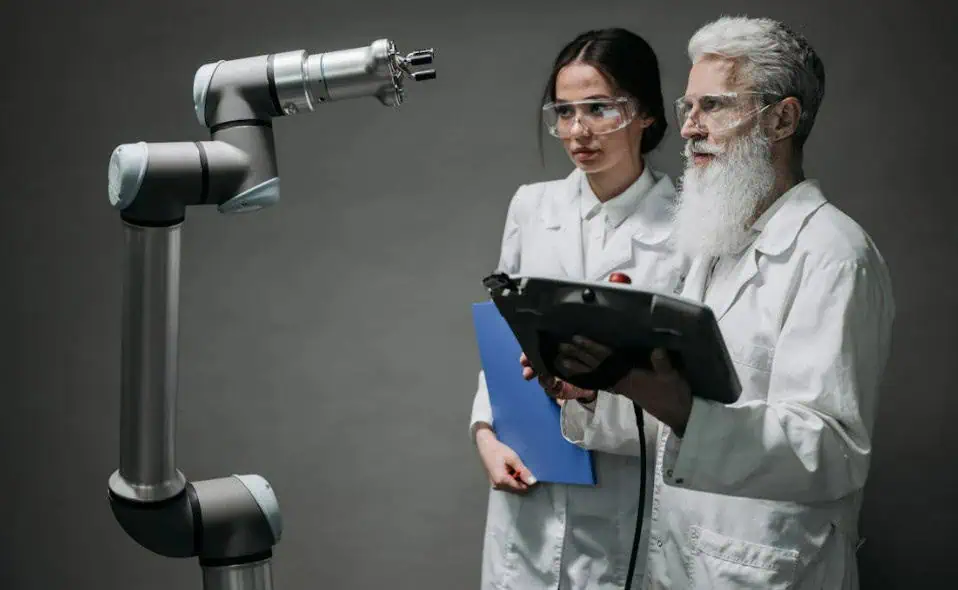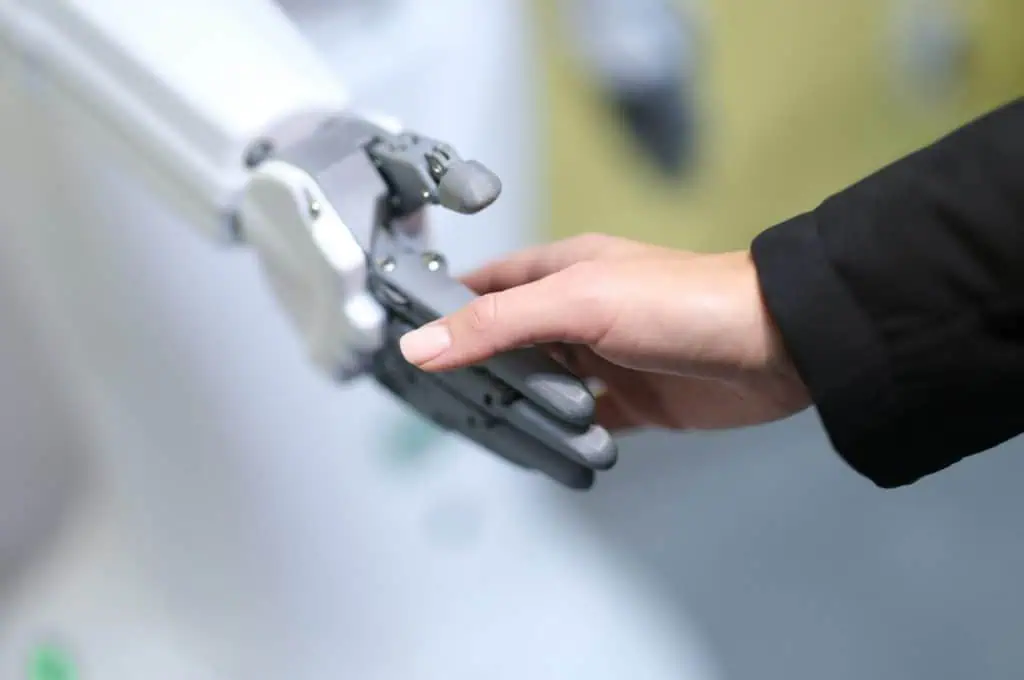The partnership between robots and humans in industry is nothing new. But the proliferation of AI has ignited a conversation about how humanity will fare as major companies choose automated industrial manipulators over people as a budget strategy for future manufacture.
Table of Contents
Some of the world’s largest employers, such as those in the automotive industry, have embraced automation from day one with Henry Ford’s production line. Yet today, there is a very real threat between robots and humans in industry, particularly within the core processes of future manufacturing.

Machines are Always Necessary
We have relied on machines for thousands of years. Every technological improvement is a threat to some worker, somewhere. The wheel, animal husbandry and modern industrial robots are examples.
Today, we rely on machines more than ever, even though the real benefits are often overlooked. Consider advanced material handlers that hoist heavy loads. This kind of automation has revolutionized manufacturing, and countless other sectors within the industry.

Robots and Humans in Industry Can Coexist
Robots and automation have been around for a long time and are getting larger all the time. The collaborative robot (Cobot) market is worth $2.3 billion today. Yet these aren’t new and have been in use since the 1980s on a large scale in vehicle manufacture.
Automotive Cobots work with humans for enhanced safety, when they aren’t a part of a fashion show! However, with AI, modern Cobots are much smaller and can learn improved functions that require motor skills.
The Practical Safety Applications
There is an argument to be made that greedy companies invest in robots to save money over time. And that argument is indeed valid. However, one of the main reasons for robot technology in industry and any other sector, is safety.
Today, AI controlled drones can enter previously inaccessible spaces, such as mines, and send back real time data about air toxicity and humidity. Any human would probably die. And do we need to mention ordnance disposal?
Human Labor Versus Robot Funding
Robots are beneficial for cutting costs, and many companies have invested in them for this reason. But even today, most recognize the value of a skilled human worker. AI systems are impressive, but they lack many of the fundamental competencies that people do.
For example, a human can make snap decisions on an emotional level. This is an obvious advantage during an emergency, where a robot would make the wrong logical choice that could cost human lives.
The Future of Robots and Humans in Industry
Using machines such as industrial manipulators is a clear advantage in manufacturing. Helpful machines like these and programmable automation have more than proved their worth. So, it’s no wonder we are taking the next evolutionary leap as AI impacts the modern workforce.
The financial incentive
So, is there a financial incentive to invest in robots? Yes, it’s generally agreed that robots and future AI propose significant cost savings. Without workers to pay, the costs of a company can come down, and they can consider using robotic elements hired through outsourced services.
More capable humanoid robots
Perhaps we aren’t quite there yet, but future robots will be more capable than they are today. It is believed that over 10,000 humanoid robots will be shipped each year by 2027, which will rise to almost 40,000 by 2038. The reason is advanced AI could replace humans for anything.
Collaboration and wider skill sets
It’s not all doom and gloom. Survival of the fittest, as proposed by Darwin, relates to adaptation. Humans are nothing if not resilient. While jobs will be lost, new jobs will be created. We are at the dawn of new sectors related to robotics, such as maintenance, just as we saw with IT.
Faster Data Gathering
The human brain is a fascinating “machine.” It’s capable of handling 11 million bits of data per second. Yet conscious thought gets in the way and reduces our effectiveness. Robots, on the other hand, have no such hindrance.
They can analyze data much quicker in real-time. Today, robots are being used to gather data that humans otherwise can’t collect, or that takes too long to gather. As such, businesses are using AI to speed up specific necessary processes vastly.
Future Career Prospects
Despite all the science function nonsense, we should be excited about the future prospects that robotics and AI can offer. There is a very real possibility of mass job displacement, but also the possibility of fresh careers.
Existing engineers can use their skills to install bots. Most will coexist across controlled area networks to share data, meaning programmers and PLC experts have a new system to look forward to. Additionally, robots also require expert maintenance.
The Inevitability of Robots and Humans in Industry
Robots aren’t new, and around 3.5 million are used today by companies such as BMW, Mercedes and GXO. So the question on inevitability has already been answered.
The real question is, “How will we adapt to a growing number of robots and AI?” no one is really answering that right now, as most people focus only on the downside. But the fact is that robots and AI have been used in automation for decades, and we still haven’t seen shiny skeletons!

The Case for Improved Wellbeing
It’s hard not to find someone who feels overworked, unfulfilled, and burned out with their job. This kind of stress is pretty common these days. But what if robots could take some of the pressure from your daily grind?
AI is already helping millions of people with simple tasks, freeing up some of their time. This is only a good thing as you are relieved of some of the work pressure you face. Future iterations of AI and robotics will be much more helpful in life, too!
Final Words About Robots and Humans in Industry
As we have seen with industrial manipulators, machines, robots, and humans have worked together for decades across many sectors. AI and robots are guaranteed to play a role in the advancement of humanity in the near future.
Whether this is for the better or worse remains to be seen, but we can remain hopeful as it opens up more job prospects. Additionally, robots and AI systems will be available to help relieve job pressure and improve wellbeing in life and work.



